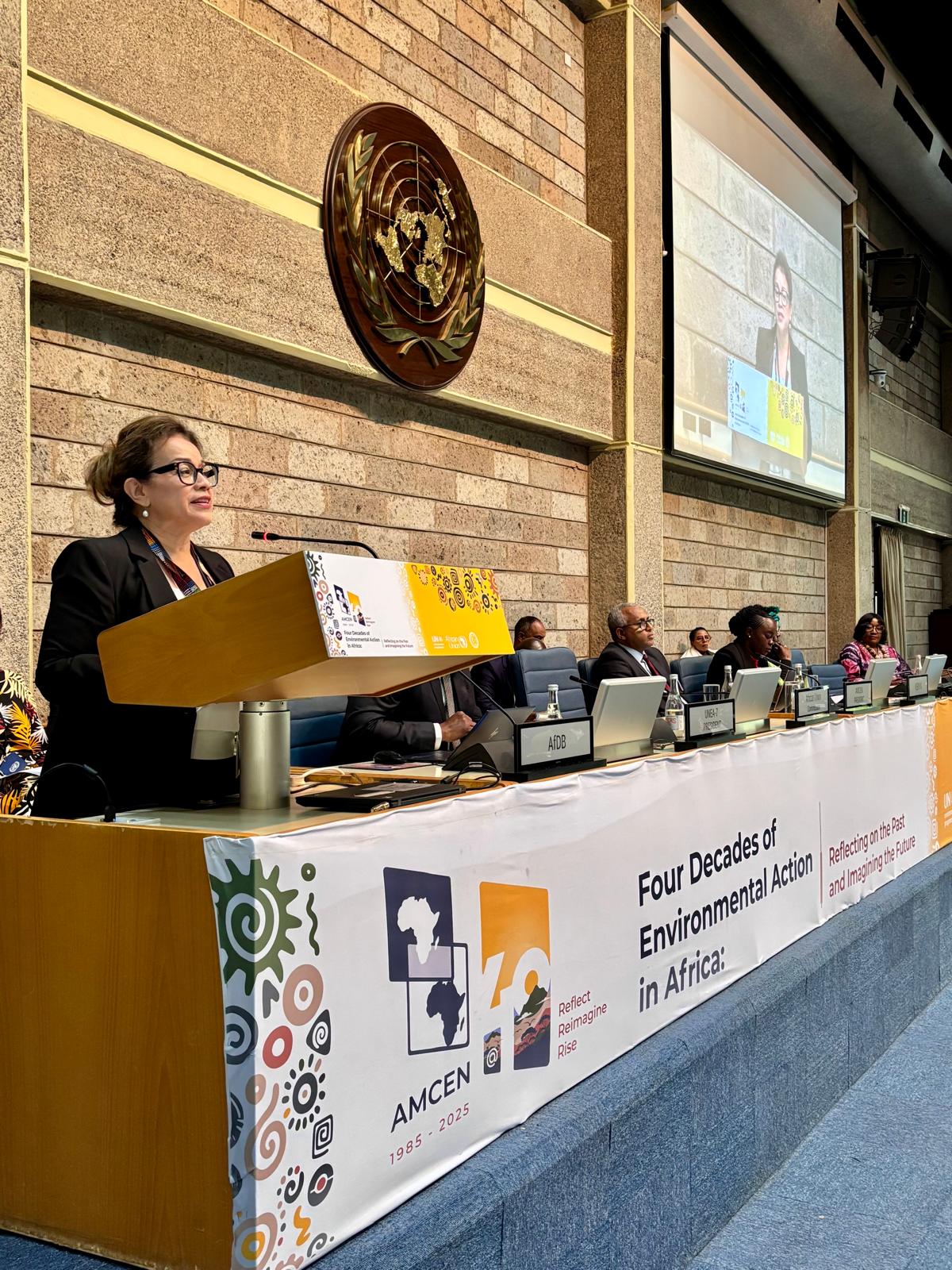African Ministerial Conference on the Environment (AMCEN) High-Level Special Session: 40th Anniversary of AMCEN
Remarks by CITES Secretary-General Ivonne Higuero
18 July 2025, Nairobi, Kenya

Your Excellency Mr. Ibrahim Al-Munir,
Chair of AMCEN and Minister of Environment of
Libya,
Your Excellency Dr. Deborah M. Barasa, Cabinet Secretary, Environment, Climate Change and Forestry for Kenya
Your Excellency Mr. Moses Vilakati, African Union Commissioner, Agriculture, Rural Development, Blue Economy and Sustainable Environment Department
His Excellency Abdullah bin Ali Al Amri, UNEA-7 President and Chair of the Environment Authority of the Sultanate of Oman
Ms Elizabeth Maruma Mrema, Deputy Executive
Director, United Nations Environment Programme,
All protocols observed.
Honourable Ministers, Distinguished Delegates,
Ladies and Gentlemen,
It is a great honour to join you at this High-Level Special Session to celebrate the fortieth anniversary of AMCEN. I am especially pleased to be here in Nairobi, a city that has stood at the heart of global environmental diplomacy for half a century and a place I called home for eight years! Warm thanks to the government of Kenya for their generous hosting.
I extend our warmest congratulations to AMCEN, its Member States, the African Union Commission, and the United Nations Environment Programme for four decades of visionary leadership and unwavering commitment to Africa’s environmental agenda.
This is not only a celebration of the past - it is a reminder of what can be achieved when African nations come together with shared purpose. As CITES also marks its fiftieth anniversary this year, we are proud to stand alongside AMCEN in honouring the legacy of multilateralism and the partnerships that have shaped global biodiversity conservation efforts.
The CITES journey is deeply rooted in Africa. It began as a vision forged in Arusha, recognized in Nairobi and Stockholm, signed in Washington, D.C., and first ratified by 10 countries - including two African States: Nigeria and Tunisia. Today, CITES is one of the most impactful multilateral environmental agreements in the world - a unique treaty where trade intersects with biodiversity.
Africa remains central to the CITES story. The continent is home to one of the richest biodiversity on the planet, encompassing a wide array of CITES-listed species – from African elephants to mahoganies, aloe, rhinos, and big cats, as well as African Grey parrots, pangolins, sharks and rays, and several species of African vultures.
At the same time, international wildlife trade represents a major economic dimension. Valued at billions of dollars annually, it provides income and generates employment opportunities. For example, in West and Central Africa, trade in timber tree species such as rosewoods, ebonies, and palisanders accounts for millions of dollars and thousands of tons of wood products each year - highlighting the importance of ensuring sustainable and well-regulated trade practices.
Africa’s commitment to wildlife conservation is demonstrated through its active engagement with CITES. The continent has hosted meetings of the CITES Conferences of the Parties in Gaborone, in Harare, in Nairobi and in Johannesburg. I am grateful to the 53 African Parties to CITES who are committed to the CITES vision of a world where all international trade in wildlife is legal, traceable, and effectively regulated, for planet and people.
In today’s world - marked by environmental, economic, and geopolitical uncertainties - the value of multilateralism has never been greater. Regional collaboration is not just a strength; it is a necessity. AMCEN has proven to be a trusted and neutral forum - where discussions are held for Africa, by Africa, and in Africa.
I would like to welcome the establishment and operationalization of the African Group of Negotiators on Wildlife as the newest AGN on environmental matters. This serves as a strong illustration of the importance of AMCEN in maintaining momentum and acting as a catalyst for deepening trust - providing a strategic space for dialogue to find common ground to strengthen Africa’s positions at CITES CoP20, while respecting the different circumstances and conditions faced by each country.
In this spirit, I welcome the adoption of Decision AMCEN/20/3: Africa’s participation at the twentieth meeting of the Conference of Parties to the Convention on International Trade in Endangered Species of Wild Fauna and Flora and the Tripoli Declaration. As you prepare for CoP20, fostering mutual understanding of national priorities and common goals, appreciating diverse conservation approaches, and identifying opportunities for collaboration across the continent will be essential, enabling Africa to amplify its collective impact on the global conservation stage.
I wish to inform you, Excellencies, that Uzbekistan, as the Host Country of CoP20, is planning to hold a Ministerial session on the eve of CoP20, on 23 November 2025. The theme will be on biodiversity and conservation finance, which is one of the priorities of the African Biodiversity Strategy and Action Plan. His Excellency Aziz Abdukhakimov, Minister of Ecology, Environmental Protection and Climate Change of Uzbekistan, has personally asked me to convey his warm invitation to the African Ministers to attend, and to call for your active in-person involvement in the Ministerial session. The invitation letters will be with you very shortly.
As we look ahead to CITES CoP20 in Samarkand, we are inspired by AMCEN’s example. We remain committed to working hand-in-hand with African countries to ensure that international trade in wild plants and animals is well-regulated and continues to support the continent’s ecological and economic resilience - for the benefit of present and future generations.
Thank you.